ENGL 1200 Essay: Analyzing Self-Awareness in Literary Works
VerifiedAdded on 2023/04/23
|6
|1980
|111
Essay
AI Summary
This essay analyzes the theme of self-awareness in Elena Ferrante’s “My Brilliant Friend” and H.D’s “Eurydice,” demonstrating how its effective usage enhances the reader's emotional connection to the works. The essay highlights Elena's self-awareness in narrating her friendship with Lily, understanding her societal privileges, and recognizing her feelings for Nino. Similarly, it examines Eurydice's self-aware perspective in H.D.'s poem, showcasing her anger, longing for earthly life, and awareness of her plight in Hades. By comparing these literary works, the essay concludes that self-awareness is a crucial element in engaging modern readers and enriching the overall appeal and pleasure of the text, making characters dynamic and relatable.
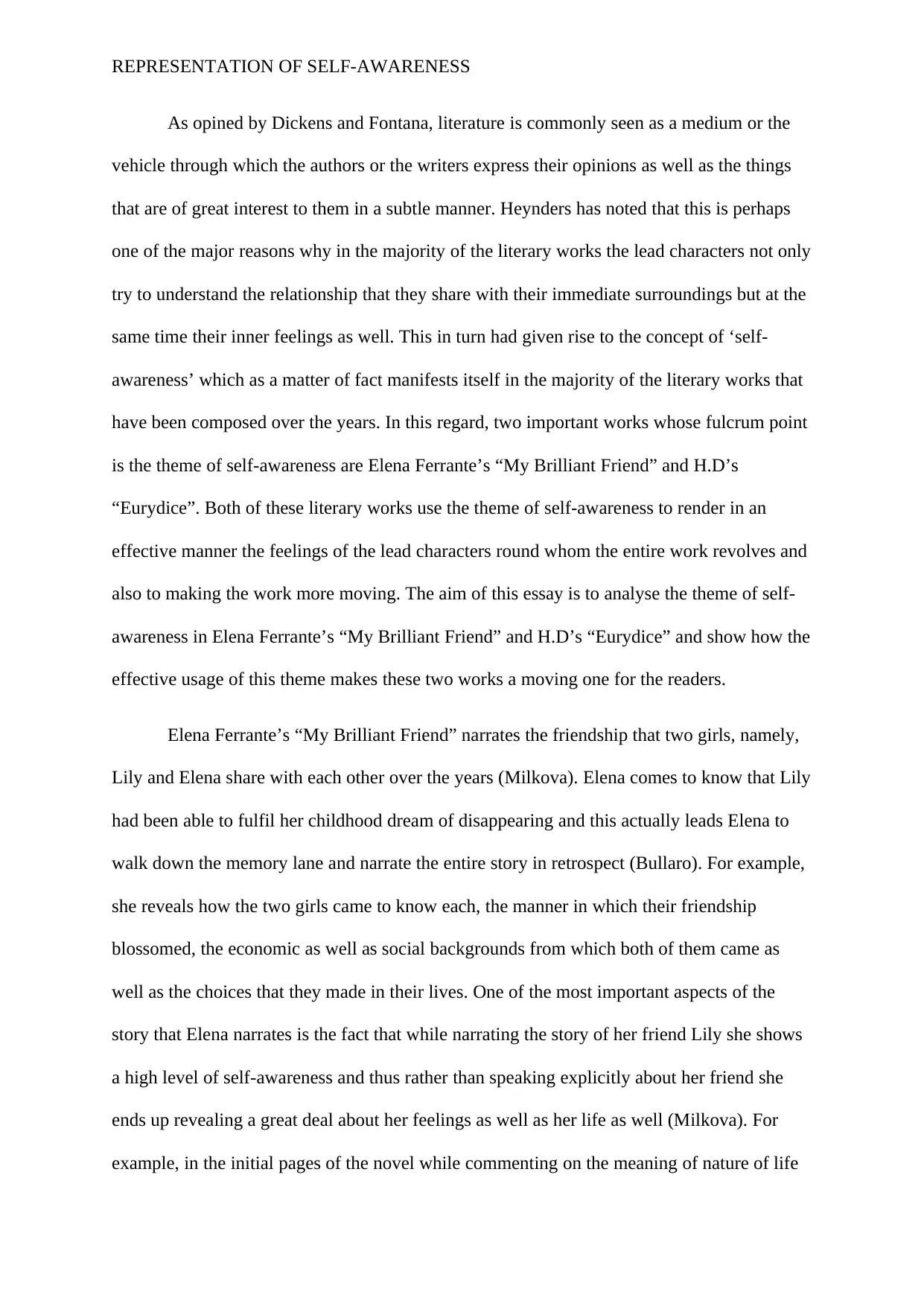
REPRESENTATION OF SELF-AWARENESS
As opined by Dickens and Fontana, literature is commonly seen as a medium or the
vehicle through which the authors or the writers express their opinions as well as the things
that are of great interest to them in a subtle manner. Heynders has noted that this is perhaps
one of the major reasons why in the majority of the literary works the lead characters not only
try to understand the relationship that they share with their immediate surroundings but at the
same time their inner feelings as well. This in turn had given rise to the concept of ‘self-
awareness’ which as a matter of fact manifests itself in the majority of the literary works that
have been composed over the years. In this regard, two important works whose fulcrum point
is the theme of self-awareness are Elena Ferrante’s “My Brilliant Friend” and H.D’s
“Eurydice”. Both of these literary works use the theme of self-awareness to render in an
effective manner the feelings of the lead characters round whom the entire work revolves and
also to making the work more moving. The aim of this essay is to analyse the theme of self-
awareness in Elena Ferrante’s “My Brilliant Friend” and H.D’s “Eurydice” and show how the
effective usage of this theme makes these two works a moving one for the readers.
Elena Ferrante’s “My Brilliant Friend” narrates the friendship that two girls, namely,
Lily and Elena share with each other over the years (Milkova). Elena comes to know that Lily
had been able to fulfil her childhood dream of disappearing and this actually leads Elena to
walk down the memory lane and narrate the entire story in retrospect (Bullaro). For example,
she reveals how the two girls came to know each, the manner in which their friendship
blossomed, the economic as well as social backgrounds from which both of them came as
well as the choices that they made in their lives. One of the most important aspects of the
story that Elena narrates is the fact that while narrating the story of her friend Lily she shows
a high level of self-awareness and thus rather than speaking explicitly about her friend she
ends up revealing a great deal about her feelings as well as her life as well (Milkova). For
example, in the initial pages of the novel while commenting on the meaning of nature of life
As opined by Dickens and Fontana, literature is commonly seen as a medium or the
vehicle through which the authors or the writers express their opinions as well as the things
that are of great interest to them in a subtle manner. Heynders has noted that this is perhaps
one of the major reasons why in the majority of the literary works the lead characters not only
try to understand the relationship that they share with their immediate surroundings but at the
same time their inner feelings as well. This in turn had given rise to the concept of ‘self-
awareness’ which as a matter of fact manifests itself in the majority of the literary works that
have been composed over the years. In this regard, two important works whose fulcrum point
is the theme of self-awareness are Elena Ferrante’s “My Brilliant Friend” and H.D’s
“Eurydice”. Both of these literary works use the theme of self-awareness to render in an
effective manner the feelings of the lead characters round whom the entire work revolves and
also to making the work more moving. The aim of this essay is to analyse the theme of self-
awareness in Elena Ferrante’s “My Brilliant Friend” and H.D’s “Eurydice” and show how the
effective usage of this theme makes these two works a moving one for the readers.
Elena Ferrante’s “My Brilliant Friend” narrates the friendship that two girls, namely,
Lily and Elena share with each other over the years (Milkova). Elena comes to know that Lily
had been able to fulfil her childhood dream of disappearing and this actually leads Elena to
walk down the memory lane and narrate the entire story in retrospect (Bullaro). For example,
she reveals how the two girls came to know each, the manner in which their friendship
blossomed, the economic as well as social backgrounds from which both of them came as
well as the choices that they made in their lives. One of the most important aspects of the
story that Elena narrates is the fact that while narrating the story of her friend Lily she shows
a high level of self-awareness and thus rather than speaking explicitly about her friend she
ends up revealing a great deal about her feelings as well as her life as well (Milkova). For
example, in the initial pages of the novel while commenting on the meaning of nature of life
Paraphrase This Document
Need a fresh take? Get an instant paraphrase of this document with our AI Paraphraser
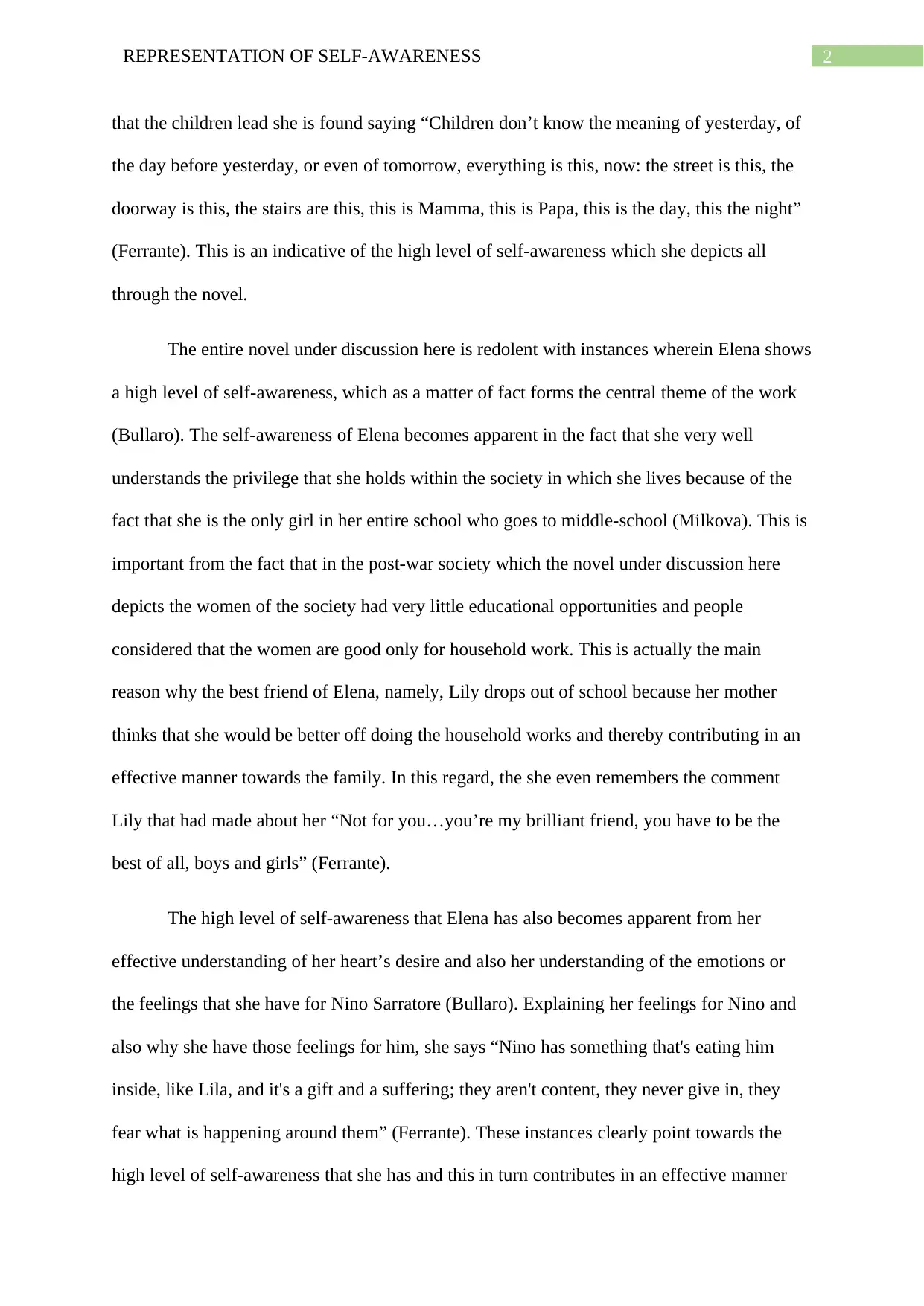
2REPRESENTATION OF SELF-AWARENESS
that the children lead she is found saying “Children don’t know the meaning of yesterday, of
the day before yesterday, or even of tomorrow, everything is this, now: the street is this, the
doorway is this, the stairs are this, this is Mamma, this is Papa, this is the day, this the night”
(Ferrante). This is an indicative of the high level of self-awareness which she depicts all
through the novel.
The entire novel under discussion here is redolent with instances wherein Elena shows
a high level of self-awareness, which as a matter of fact forms the central theme of the work
(Bullaro). The self-awareness of Elena becomes apparent in the fact that she very well
understands the privilege that she holds within the society in which she lives because of the
fact that she is the only girl in her entire school who goes to middle-school (Milkova). This is
important from the fact that in the post-war society which the novel under discussion here
depicts the women of the society had very little educational opportunities and people
considered that the women are good only for household work. This is actually the main
reason why the best friend of Elena, namely, Lily drops out of school because her mother
thinks that she would be better off doing the household works and thereby contributing in an
effective manner towards the family. In this regard, the she even remembers the comment
Lily that had made about her “Not for you…you’re my brilliant friend, you have to be the
best of all, boys and girls” (Ferrante).
The high level of self-awareness that Elena has also becomes apparent from her
effective understanding of her heart’s desire and also her understanding of the emotions or
the feelings that she have for Nino Sarratore (Bullaro). Explaining her feelings for Nino and
also why she have those feelings for him, she says “Nino has something that's eating him
inside, like Lila, and it's a gift and a suffering; they aren't content, they never give in, they
fear what is happening around them” (Ferrante). These instances clearly point towards the
high level of self-awareness that she has and this in turn contributes in an effective manner
that the children lead she is found saying “Children don’t know the meaning of yesterday, of
the day before yesterday, or even of tomorrow, everything is this, now: the street is this, the
doorway is this, the stairs are this, this is Mamma, this is Papa, this is the day, this the night”
(Ferrante). This is an indicative of the high level of self-awareness which she depicts all
through the novel.
The entire novel under discussion here is redolent with instances wherein Elena shows
a high level of self-awareness, which as a matter of fact forms the central theme of the work
(Bullaro). The self-awareness of Elena becomes apparent in the fact that she very well
understands the privilege that she holds within the society in which she lives because of the
fact that she is the only girl in her entire school who goes to middle-school (Milkova). This is
important from the fact that in the post-war society which the novel under discussion here
depicts the women of the society had very little educational opportunities and people
considered that the women are good only for household work. This is actually the main
reason why the best friend of Elena, namely, Lily drops out of school because her mother
thinks that she would be better off doing the household works and thereby contributing in an
effective manner towards the family. In this regard, the she even remembers the comment
Lily that had made about her “Not for you…you’re my brilliant friend, you have to be the
best of all, boys and girls” (Ferrante).
The high level of self-awareness that Elena has also becomes apparent from her
effective understanding of her heart’s desire and also her understanding of the emotions or
the feelings that she have for Nino Sarratore (Bullaro). Explaining her feelings for Nino and
also why she have those feelings for him, she says “Nino has something that's eating him
inside, like Lila, and it's a gift and a suffering; they aren't content, they never give in, they
fear what is happening around them” (Ferrante). These instances clearly point towards the
high level of self-awareness that she has and this in turn contributes in an effective manner
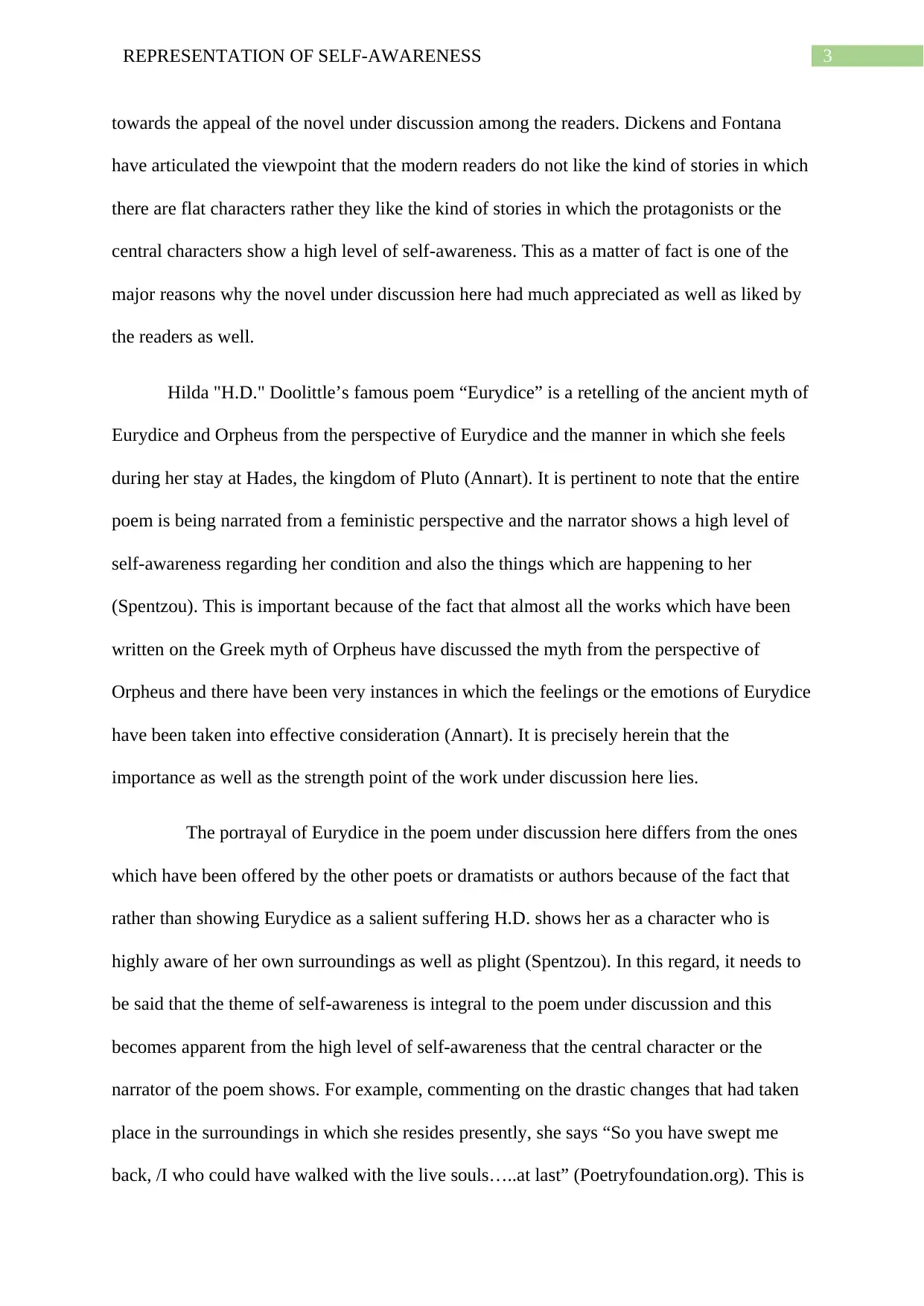
3REPRESENTATION OF SELF-AWARENESS
towards the appeal of the novel under discussion among the readers. Dickens and Fontana
have articulated the viewpoint that the modern readers do not like the kind of stories in which
there are flat characters rather they like the kind of stories in which the protagonists or the
central characters show a high level of self-awareness. This as a matter of fact is one of the
major reasons why the novel under discussion here had much appreciated as well as liked by
the readers as well.
Hilda "H.D." Doolittle’s famous poem “Eurydice” is a retelling of the ancient myth of
Eurydice and Orpheus from the perspective of Eurydice and the manner in which she feels
during her stay at Hades, the kingdom of Pluto (Annart). It is pertinent to note that the entire
poem is being narrated from a feministic perspective and the narrator shows a high level of
self-awareness regarding her condition and also the things which are happening to her
(Spentzou). This is important because of the fact that almost all the works which have been
written on the Greek myth of Orpheus have discussed the myth from the perspective of
Orpheus and there have been very instances in which the feelings or the emotions of Eurydice
have been taken into effective consideration (Annart). It is precisely herein that the
importance as well as the strength point of the work under discussion here lies.
The portrayal of Eurydice in the poem under discussion here differs from the ones
which have been offered by the other poets or dramatists or authors because of the fact that
rather than showing Eurydice as a salient suffering H.D. shows her as a character who is
highly aware of her own surroundings as well as plight (Spentzou). In this regard, it needs to
be said that the theme of self-awareness is integral to the poem under discussion and this
becomes apparent from the high level of self-awareness that the central character or the
narrator of the poem shows. For example, commenting on the drastic changes that had taken
place in the surroundings in which she resides presently, she says “So you have swept me
back, /I who could have walked with the live souls…..at last” (Poetryfoundation.org). This is
towards the appeal of the novel under discussion among the readers. Dickens and Fontana
have articulated the viewpoint that the modern readers do not like the kind of stories in which
there are flat characters rather they like the kind of stories in which the protagonists or the
central characters show a high level of self-awareness. This as a matter of fact is one of the
major reasons why the novel under discussion here had much appreciated as well as liked by
the readers as well.
Hilda "H.D." Doolittle’s famous poem “Eurydice” is a retelling of the ancient myth of
Eurydice and Orpheus from the perspective of Eurydice and the manner in which she feels
during her stay at Hades, the kingdom of Pluto (Annart). It is pertinent to note that the entire
poem is being narrated from a feministic perspective and the narrator shows a high level of
self-awareness regarding her condition and also the things which are happening to her
(Spentzou). This is important because of the fact that almost all the works which have been
written on the Greek myth of Orpheus have discussed the myth from the perspective of
Orpheus and there have been very instances in which the feelings or the emotions of Eurydice
have been taken into effective consideration (Annart). It is precisely herein that the
importance as well as the strength point of the work under discussion here lies.
The portrayal of Eurydice in the poem under discussion here differs from the ones
which have been offered by the other poets or dramatists or authors because of the fact that
rather than showing Eurydice as a salient suffering H.D. shows her as a character who is
highly aware of her own surroundings as well as plight (Spentzou). In this regard, it needs to
be said that the theme of self-awareness is integral to the poem under discussion and this
becomes apparent from the high level of self-awareness that the central character or the
narrator of the poem shows. For example, commenting on the drastic changes that had taken
place in the surroundings in which she resides presently, she says “So you have swept me
back, /I who could have walked with the live souls…..at last” (Poetryfoundation.org). This is
⊘ This is a preview!⊘
Do you want full access?
Subscribe today to unlock all pages.

Trusted by 1+ million students worldwide
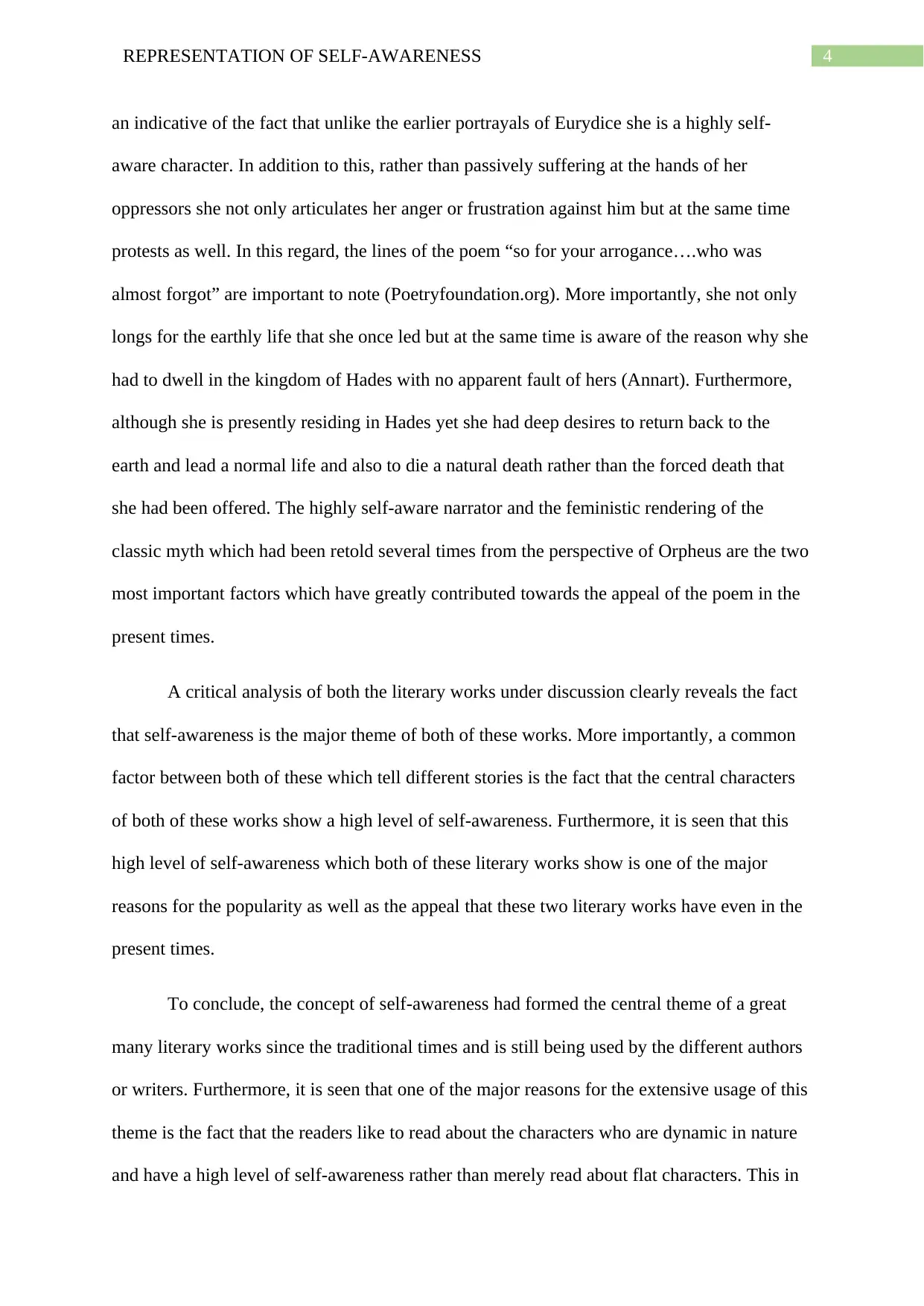
4REPRESENTATION OF SELF-AWARENESS
an indicative of the fact that unlike the earlier portrayals of Eurydice she is a highly self-
aware character. In addition to this, rather than passively suffering at the hands of her
oppressors she not only articulates her anger or frustration against him but at the same time
protests as well. In this regard, the lines of the poem “so for your arrogance….who was
almost forgot” are important to note (Poetryfoundation.org). More importantly, she not only
longs for the earthly life that she once led but at the same time is aware of the reason why she
had to dwell in the kingdom of Hades with no apparent fault of hers (Annart). Furthermore,
although she is presently residing in Hades yet she had deep desires to return back to the
earth and lead a normal life and also to die a natural death rather than the forced death that
she had been offered. The highly self-aware narrator and the feministic rendering of the
classic myth which had been retold several times from the perspective of Orpheus are the two
most important factors which have greatly contributed towards the appeal of the poem in the
present times.
A critical analysis of both the literary works under discussion clearly reveals the fact
that self-awareness is the major theme of both of these works. More importantly, a common
factor between both of these which tell different stories is the fact that the central characters
of both of these works show a high level of self-awareness. Furthermore, it is seen that this
high level of self-awareness which both of these literary works show is one of the major
reasons for the popularity as well as the appeal that these two literary works have even in the
present times.
To conclude, the concept of self-awareness had formed the central theme of a great
many literary works since the traditional times and is still being used by the different authors
or writers. Furthermore, it is seen that one of the major reasons for the extensive usage of this
theme is the fact that the readers like to read about the characters who are dynamic in nature
and have a high level of self-awareness rather than merely read about flat characters. This in
an indicative of the fact that unlike the earlier portrayals of Eurydice she is a highly self-
aware character. In addition to this, rather than passively suffering at the hands of her
oppressors she not only articulates her anger or frustration against him but at the same time
protests as well. In this regard, the lines of the poem “so for your arrogance….who was
almost forgot” are important to note (Poetryfoundation.org). More importantly, she not only
longs for the earthly life that she once led but at the same time is aware of the reason why she
had to dwell in the kingdom of Hades with no apparent fault of hers (Annart). Furthermore,
although she is presently residing in Hades yet she had deep desires to return back to the
earth and lead a normal life and also to die a natural death rather than the forced death that
she had been offered. The highly self-aware narrator and the feministic rendering of the
classic myth which had been retold several times from the perspective of Orpheus are the two
most important factors which have greatly contributed towards the appeal of the poem in the
present times.
A critical analysis of both the literary works under discussion clearly reveals the fact
that self-awareness is the major theme of both of these works. More importantly, a common
factor between both of these which tell different stories is the fact that the central characters
of both of these works show a high level of self-awareness. Furthermore, it is seen that this
high level of self-awareness which both of these literary works show is one of the major
reasons for the popularity as well as the appeal that these two literary works have even in the
present times.
To conclude, the concept of self-awareness had formed the central theme of a great
many literary works since the traditional times and is still being used by the different authors
or writers. Furthermore, it is seen that one of the major reasons for the extensive usage of this
theme is the fact that the readers like to read about the characters who are dynamic in nature
and have a high level of self-awareness rather than merely read about flat characters. This in
Paraphrase This Document
Need a fresh take? Get an instant paraphrase of this document with our AI Paraphraser
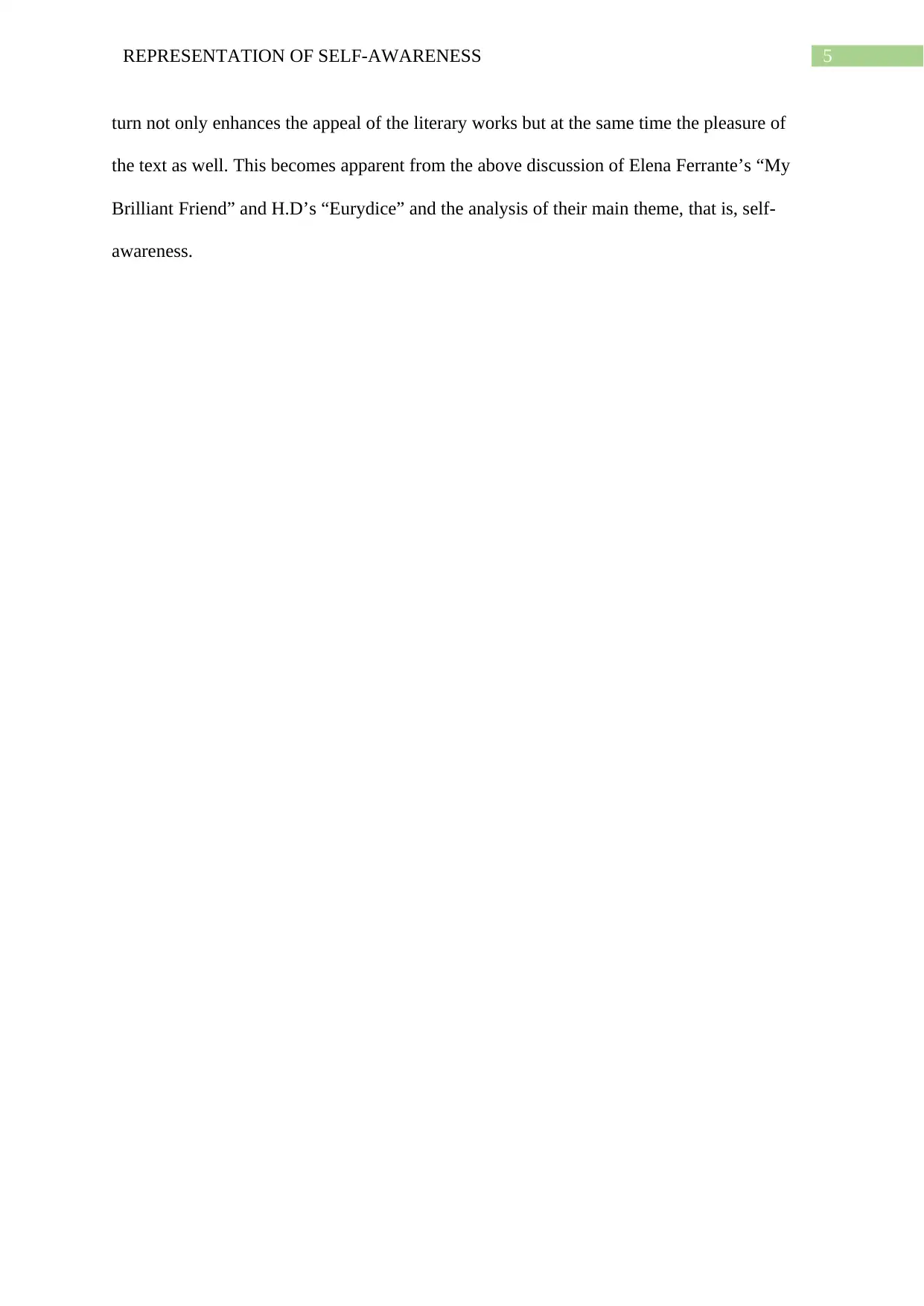
5REPRESENTATION OF SELF-AWARENESS
turn not only enhances the appeal of the literary works but at the same time the pleasure of
the text as well. This becomes apparent from the above discussion of Elena Ferrante’s “My
Brilliant Friend” and H.D’s “Eurydice” and the analysis of their main theme, that is, self-
awareness.
turn not only enhances the appeal of the literary works but at the same time the pleasure of
the text as well. This becomes apparent from the above discussion of Elena Ferrante’s “My
Brilliant Friend” and H.D’s “Eurydice” and the analysis of their main theme, that is, self-
awareness.
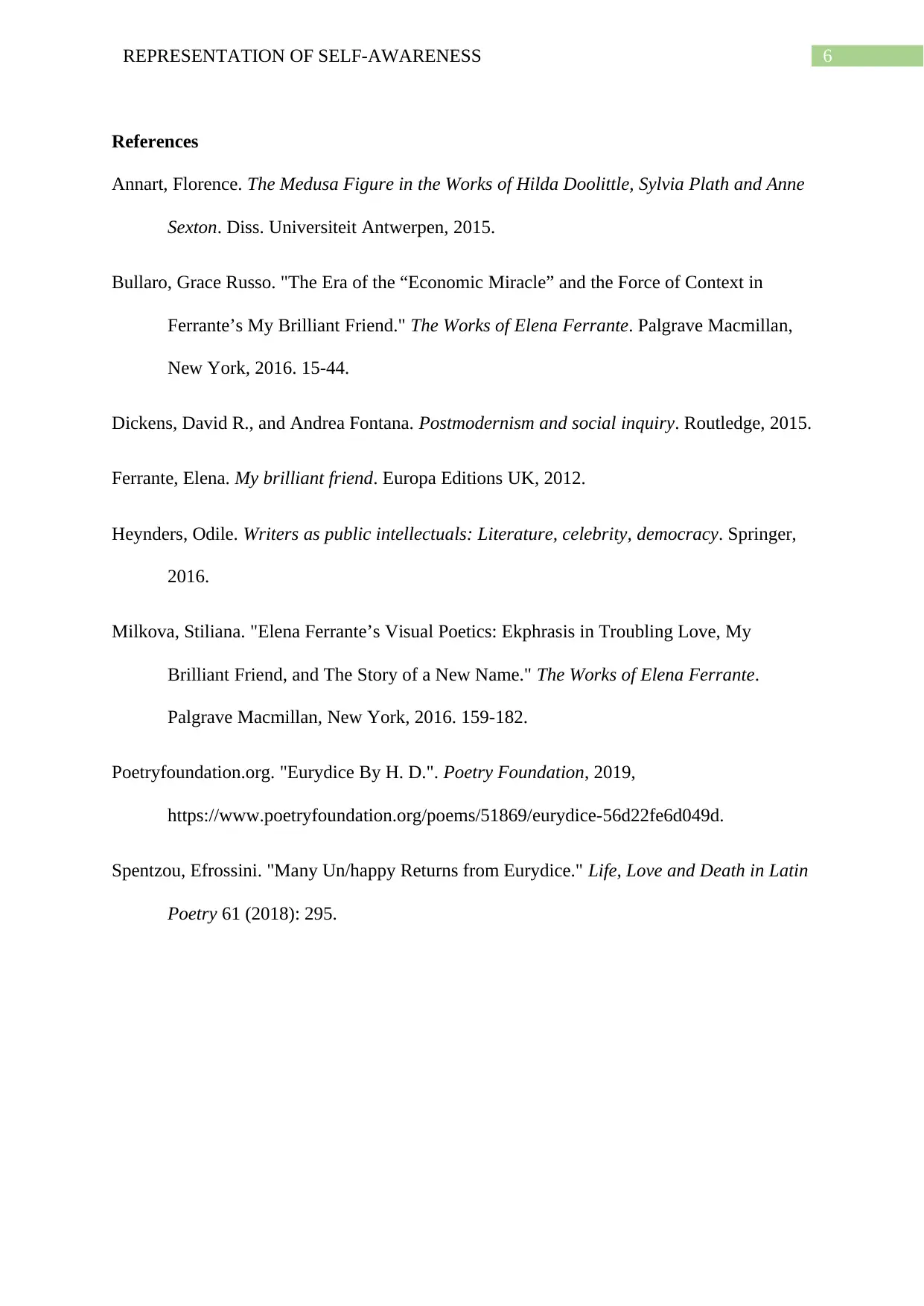
6REPRESENTATION OF SELF-AWARENESS
References
Annart, Florence. The Medusa Figure in the Works of Hilda Doolittle, Sylvia Plath and Anne
Sexton. Diss. Universiteit Antwerpen, 2015.
Bullaro, Grace Russo. "The Era of the “Economic Miracle” and the Force of Context in
Ferrante’s My Brilliant Friend." The Works of Elena Ferrante. Palgrave Macmillan,
New York, 2016. 15-44.
Dickens, David R., and Andrea Fontana. Postmodernism and social inquiry. Routledge, 2015.
Ferrante, Elena. My brilliant friend. Europa Editions UK, 2012.
Heynders, Odile. Writers as public intellectuals: Literature, celebrity, democracy. Springer,
2016.
Milkova, Stiliana. "Elena Ferrante’s Visual Poetics: Ekphrasis in Troubling Love, My
Brilliant Friend, and The Story of a New Name." The Works of Elena Ferrante.
Palgrave Macmillan, New York, 2016. 159-182.
Poetryfoundation.org. "Eurydice By H. D.". Poetry Foundation, 2019,
https://www.poetryfoundation.org/poems/51869/eurydice-56d22fe6d049d.
Spentzou, Efrossini. "Many Un/happy Returns from Eurydice." Life, Love and Death in Latin
Poetry 61 (2018): 295.
References
Annart, Florence. The Medusa Figure in the Works of Hilda Doolittle, Sylvia Plath and Anne
Sexton. Diss. Universiteit Antwerpen, 2015.
Bullaro, Grace Russo. "The Era of the “Economic Miracle” and the Force of Context in
Ferrante’s My Brilliant Friend." The Works of Elena Ferrante. Palgrave Macmillan,
New York, 2016. 15-44.
Dickens, David R., and Andrea Fontana. Postmodernism and social inquiry. Routledge, 2015.
Ferrante, Elena. My brilliant friend. Europa Editions UK, 2012.
Heynders, Odile. Writers as public intellectuals: Literature, celebrity, democracy. Springer,
2016.
Milkova, Stiliana. "Elena Ferrante’s Visual Poetics: Ekphrasis in Troubling Love, My
Brilliant Friend, and The Story of a New Name." The Works of Elena Ferrante.
Palgrave Macmillan, New York, 2016. 159-182.
Poetryfoundation.org. "Eurydice By H. D.". Poetry Foundation, 2019,
https://www.poetryfoundation.org/poems/51869/eurydice-56d22fe6d049d.
Spentzou, Efrossini. "Many Un/happy Returns from Eurydice." Life, Love and Death in Latin
Poetry 61 (2018): 295.
⊘ This is a preview!⊘
Do you want full access?
Subscribe today to unlock all pages.

Trusted by 1+ million students worldwide
1 out of 6
Your All-in-One AI-Powered Toolkit for Academic Success.
+13062052269
info@desklib.com
Available 24*7 on WhatsApp / Email
![[object Object]](/_next/static/media/star-bottom.7253800d.svg)
Unlock your academic potential
Copyright © 2020–2025 A2Z Services. All Rights Reserved. Developed and managed by ZUCOL.
